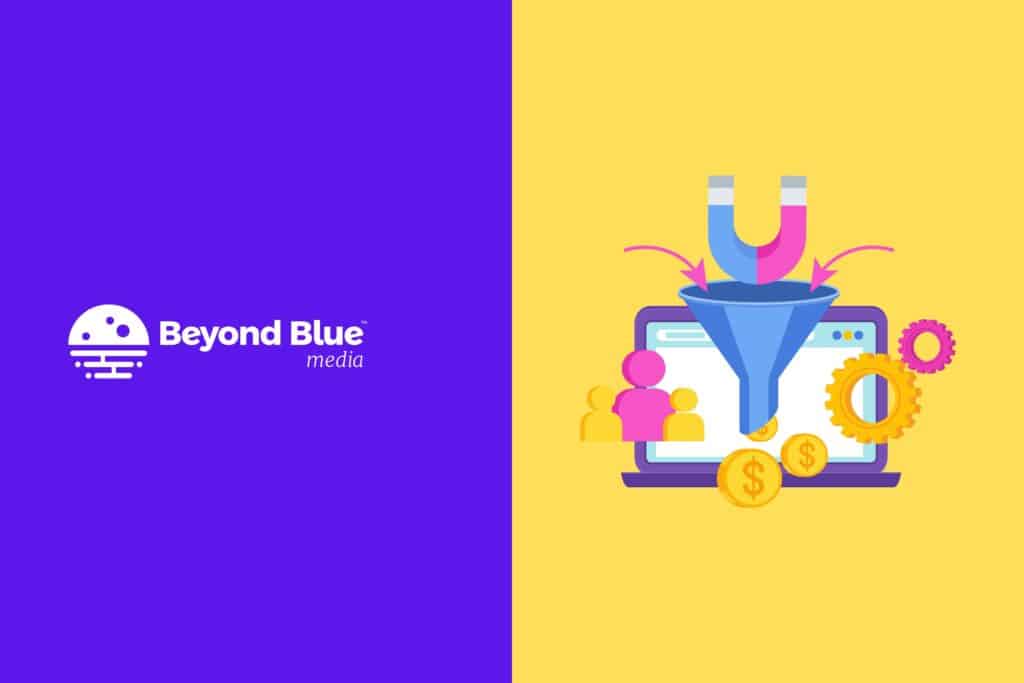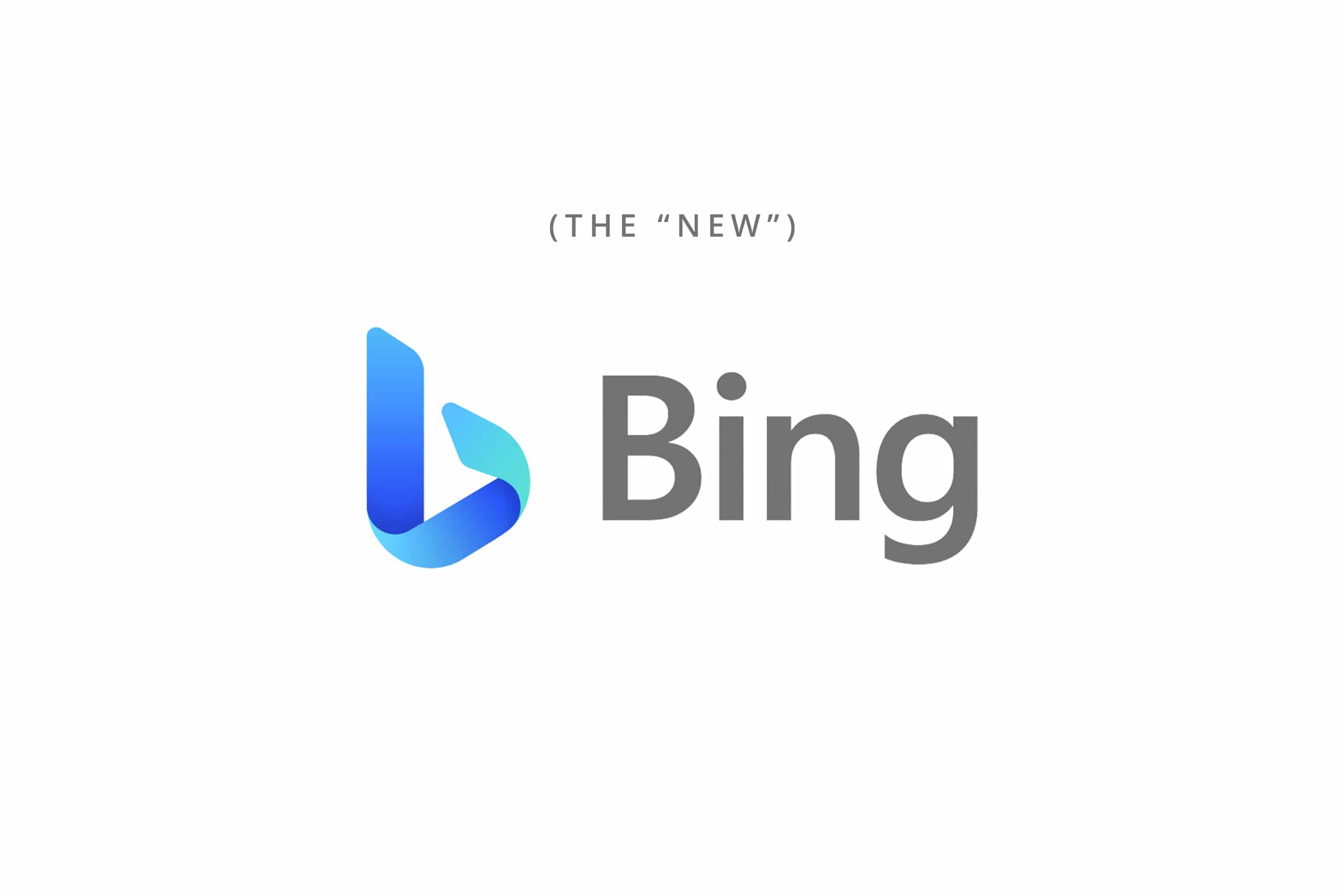
The New Bing: 5 Major Shortcomings of Bing Chat: If you haven't heard of the "new" Bing or ChatGPT, there's a good chance you've been living under a rock for the last five months. Since its inception in 2015, OpenAI—the creator of ChatGPT—has been a frontrunner in making artificial intelligence (AI) easy to use and accessible to the average person.
But the biggest problem with AI until recently—as in the last year or so—was... well, it kinda sucked. Information was unreliable, it was easy to distinguish between human-written and AI-generated content, and the possibilities were highly limited. But since the launch of ChatGPT-3 on August 10, 2020, OpenAI has been pushing toward a brighter future for all and has made some highly impressive strides in the AI content generation world.
Modern AI models are incredibly accurate, easy to work with, and often produce content that is nearly impossible to distinguish from a human. But of course, since AI models are created by humans and modeled after work written by humans, there will always be room for error and imperfection. But with each prompt we enter into the OpenAI playground or ChatGPT-3/4 model, the algorithms will continue to learn and advance.
OpenAI, Microsoft, and the "New" Bing
OpenAI was making such an impact that Microsoft officially invested $1 billion into the company in 2019 and another $10 billion in 2021. Since then, Microsoft has worked tirelessly to find a way to implement the highly popular ChatGPT model into their not-so-popular search engine, Bing (which was definitely the ultimate meme since it stood for Because it's not Google; and for that, I have a bit of respect).
Fast forward to February of 2023, Bing officially announced their beta-testing edition of the "new" Bing, which features a ChatGPT-4-based chatbot feature that is supposed to improve search results and efficiency. Naturally, we are a Fort Collins marketing agency with a curious SEO department, so we got on the waitlist. And we waited. And waited. And waited until we eventually got access.
After using it for a couple of weeks as of writing this post, we have some thoughts and concerns that we feel should be addressed before everyone starts relying solely on AI bots to help them find what they're looking for. So, without further ado, let's get into the five biggest reasons why we aren't fans of the "new" Bing. Remember that these are all opinions of the new tool and should be taken as such.
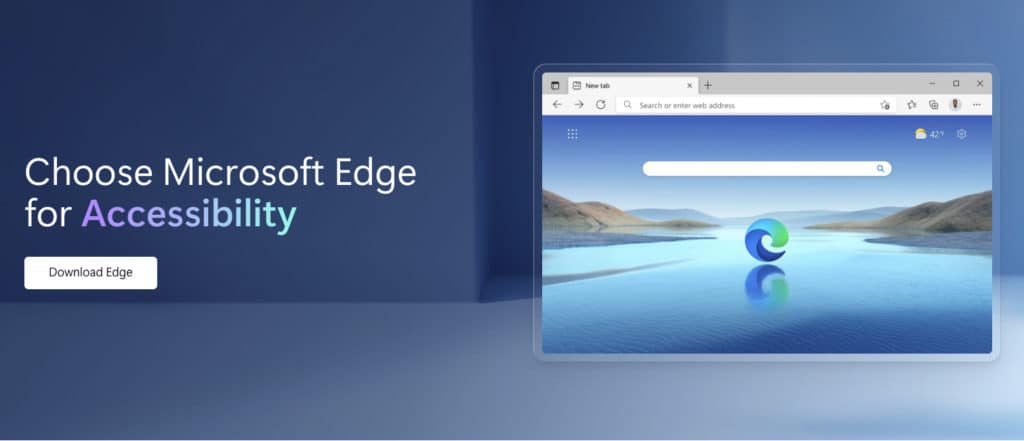
Problem #1: Restricted to Microsoft Edge Browser
Obviously, Microsoft doesn't want to gain a bunch of clout around their fancy new Bing chat feature only to have users access this tool from a browser other than their own. But the fact that the new Bing chat feature is currently on a waitlist makes it even more annoying that once you get through the long wait, you then have to download Microsoft Edge to use it.
And let's face it, most of us probably aren't using Edge since it is merely a glorified Internet Explorer remake. Okay, that is definitely a biased point of view, but I digress.
It is my opinion that once the new Bing chat feature is open to the public that they will make it accessible from all browsers, but I also wouldn't be surprised if they continued to restrict its use to their own. After all, they have been struggling for over a decade to scratch the surface of the market share that Google has dominated since its inception.
The bottom line, though, is that for now and the foreseeable future, if you want to use the new Bing's ChatGPT-4 bot, you will have to download Microsoft Edge whether you like it or not. In my opinion, that is unwise on Microsoft's end for one reason: they are limiting the number of people to test the software and help them make it better.
But, then again, maybe that's their intention: only to allow a small handful of people devoted enough to beta testing that will make useful suggestions to better the system. Either way, I wanted to test it badly enough, so you better believe I am rocking Edge on my MacBook Pro (purely for research purposes, of course).

Problem #2: Slow Response Time
Take a moment to view the gif above. As you can see, when comparing the amount of time it takes to search for something on Google (or Bing, of course), the new Bing chat feature takes a substantially longer amount of time to return results.
It's understandable that it takes this long to produce an answer. The bot has first to process your query, then search Bing to find results pertaining to your query, then scan the search engine results page (SERP), and finally process the data on that page and tie it into your original query and deliver a response that would mimic that of a human doing all this research.
So, although I see this as a shortcoming of the current tool, if we put things in perspective and compare these results to you taking the time to find similar results, one could consider this new tool an advantage. But most humans are conditioned to finding millions of results within half a second, so this initial wait time will most likely not be received very well by our short attention spans.
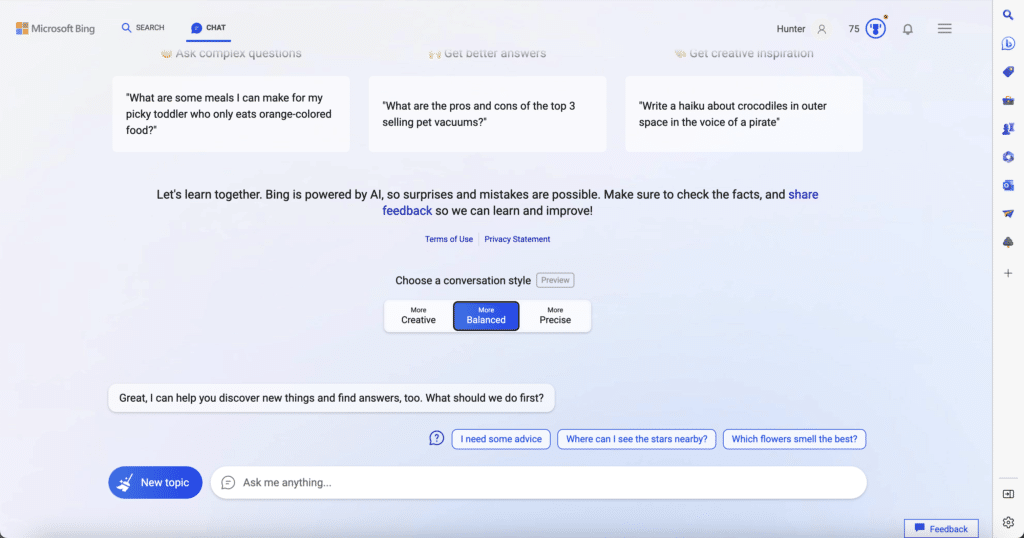
Problem #3: Poor User Experience
User experience is an art form, so it is only natural that there will be contrasting, subjective opinions. But, for the sake of this topic, I will attempt to be as objective as possible and convey areas in which I see a need for improvement.
Overall, it's not an ugly interface. I like the overall look and design elements they've used, but the biggest problem I have with this interface is that it feels like I'm in a chatroom with a Microsoft support technician. I understand the idea of a chatbot is to receive personalized responses as though you were talking with an actual human.
But since Microsoft is trying to integrate a chatbot into a search engine, I would have loved to see more creativity in doing so. For example, I think it would be great if the new Bing chat feature were incorporated into their traditional SERPs as they made it seem like it would have been in their initial previews (see below):
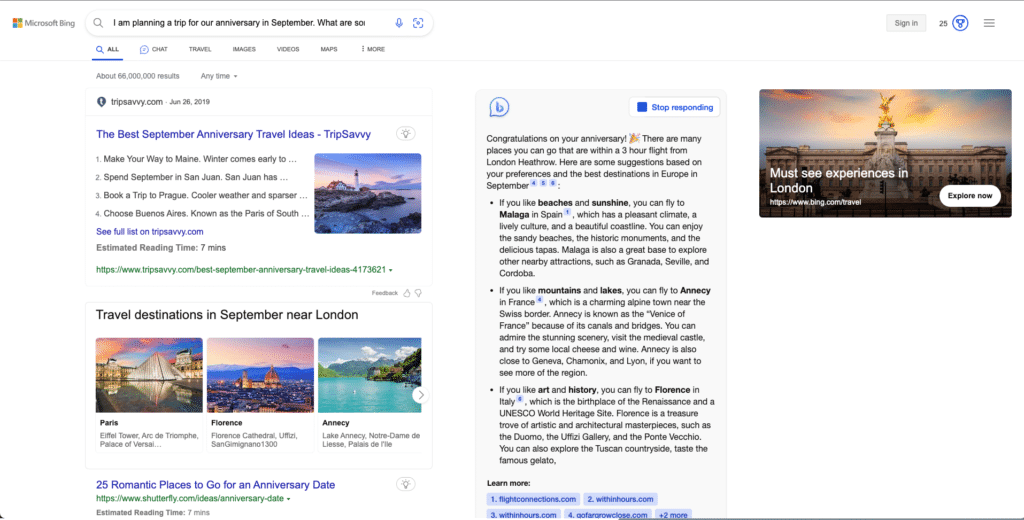
As of now, when you click on some of the premade question examples without yet having access to the new Bing, this is what one might see on their screen. I like this a lot more than being limited to a chatroom; this way, I can have the option to read the AI-generated response or quickly locate the information for which I am searching in the traditional SERP layout.
But as it's set up for other search queries, it feels limited. I'm someone who likes to review multiple results to see if there is a general consensus between all of them. Otherwise, I don't know how true the information in front of me is. This leads me to my next two points.
Problem #4: Biased Results
First of all, I have no way of actually proving this theory of mine, but after I explain, hopefully, it will make more sense.
AI is a human-made creation, yes? Yes. So, with that, the biggest challenge to overcome has been generating non-biased content—unless the user is specifically asking for a particular bias. But like anything humans make, there are always imperfections, and AI is no exception.
In my short amount of time using the new Bing chat feature, I've seen some great results with some great non-biased explanations or responses. But, the problem I have with AI generating results for me is that there will always be a bias. Even if it goes in accordance with my own, there will always be some opinionated reason-making behind why my query returned a specific set of results.
I'm not here to talk about different biases and start a controversy overload, but the fact is AI is biased because people are biased. At least with the traditional search engine algorithms, we can sift through as many different results as we want until we find the least-biased answers to our questions (again, some people only read what they want to read, so this isn't always the case).
But for many of us, like myself, I want to know the facts as they stand; I don't want them skewed in any way, whether it would improve my opinion of something or not. You might wonder why I am so concerned about biased results when this entire post is biased. Well, at the beginning of this article, I stated that everything was simply the opinions of our SEO department and should not be taken as fact, so please use this information only as a means to develop your own opinions.
But do yourselves a favor and look into the new Bing chat feature to have all the facts before drawing your own conclusions. Sometimes biased results are a good thing, but for more linear questions, there are right and wrong answers. And this particular point leads me to my final and most egregious point.
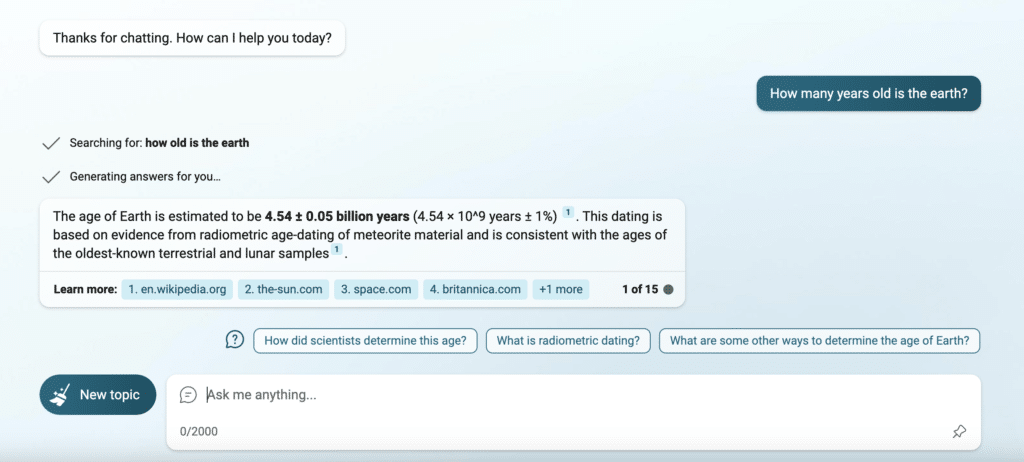
Problem #5: Limited Results
By far, the biggest issue we have with the new Bing chat feature is that it returns only five results for each search query. For someone who works professionally in SEO, this is a huge issue. We often work with clients just starting out in their business with minimal to no SEO juice, as we like to call it.
So the reason this limited number of search results is a problem is similar to the concept that "the rich get richer and the poor get poorer." In other words, websites that have had decades to establish themselves as dominating forces on search engines will continue to show up in these results. But websites needing a bit more help will not even have a chance to show up when they are in the top ten results.
Aside from making SEO more cut-throat, we are also not a fan of having only five results because, as I mentioned before, we like to sift through our options and get a general consensus as an answer to our questions rather than a one-sided matter-of-fact, potentially biased answer. It's also hard to take information from Wikipedia as fact because, well, maybe this is just because, growing up, teachers refused to accept Wikipedia as a source, but Wikipedia is not always the most reliable source for information.
That's not to say it hasn't improved since I was a kid, but I usually take everything I read on there with a grain of salt. In any event, having a limited number of results is a surefire way to limit the amount of information available to the public. In this case, it can even lead to the spread of misinformation.
The Bottom Line
Now that we've covered in depth our least favorite aspects of the new Bing let's summarize our points into a nice bite-sized piece. Microsoft Edge is not by any means the most popular browser in today's market, making it a bit of a hassle to have to switch to access the new Bing chat.
The incredibly slow response time will surely turn away millions of people like me with a less-than-stellar attention span. Additionally, the user experience is less than ideal and feels more like being in chatroom limbo than a $10 billion ChatGPT search tool.
But the biggest issues we have are that the slightly biased results—which, as we said, are limited to five per search—make it hard to know if you're getting an answer with any basis in truth. Sure, people who write posts like this one often spread opinions, but if an AI bot is unable to see that bias in a post, it might do a better job at spreading false information to someone looking for a quick answer than be the "tool everyone wants and needs in 2023."
Our overall consensus is this: the new Bing chat feature is still in its infancy. It needs a lot of work before it's ready for public use, which is only natural with new technology. As it stands, we hope that this opinionated post might capture the attention of the people developing the new Bing chat feature so they can see our feedback and possibly implement changes to better the tool.
If you've already gained access and don't mind using Microsoft Edge, we implore you to play with the new Bing as much as possible. Each query and piece of feedback submitted will only help them make it better. And now that we've spent 2,100 words talking about the shortcomings of the new Bing, I want to end on a high note:
This new tool is incredibly unique and has the potential to revolutionize the way humans search for and receive information completely. I am incredibly excited to see what sort of changes this invokes, but as will all new technology, it's important to tread lightly and keep an open mind. While we feel it has a long way to go, this sort of advancement will undoubtedly lead to more opportunities for humanity than ever before.

